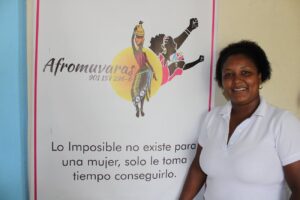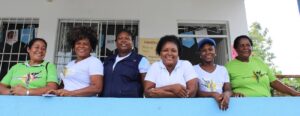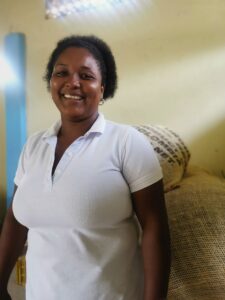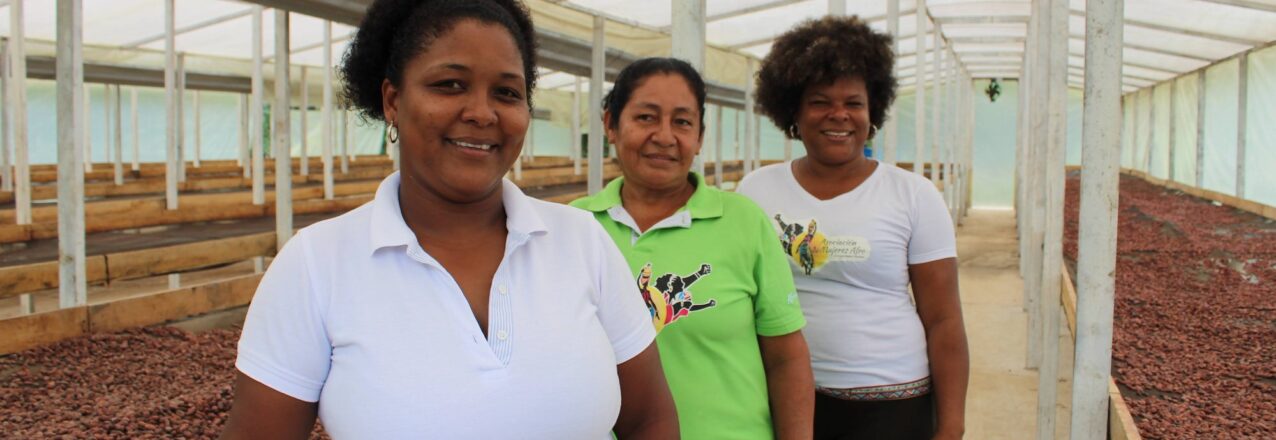USAID is echoing the voices of women asserting their rights to land.
 As part of the 16 days of activism to end violence against women and girls, LFP talked to Judith Rodríguez, a member of AFROMUVARAS, an association of afro-Colombian women who farm cacao in the Rescate Las Varas Community Council in Tumaco, Nariño.
As part of the 16 days of activism to end violence against women and girls, LFP talked to Judith Rodríguez, a member of AFROMUVARAS, an association of afro-Colombian women who farm cacao in the Rescate Las Varas Community Council in Tumaco, Nariño.
Despite violence against women in her municipality and community, people are changing their mentality. Women, in particular, are becoming aware of their rights to land and the importance of their contributions to the productive development of their collective territories and the care of their families.
In 2021, USAID’s Land for Prosperity Activity created a public-private partnership in the cacao value chain in Tumaco, which seeks to strengthen farmer associations like AFROMUVARAS so they can improve the quality of their cacao and access new markets. The cacao association was founded in 2017 and has 367 members.
What has the experience of having a collective land title for AFROMUVARAS been like?
JR: For us women, the collective land title means we are taking back what once was ours. As women, we are always forced to depend on men. Lately, there has been a lot of progress, and we are very thankful for it. In AFROMUVARAS it has been a wonderful experience to be part of this big group of women who want to develop their territory and improve the quality of life for women in rural areas. We want to make progress collectively, to be the voice of women in these regions, to take a chance on peace, on the wellbeing of our children, on the growth of our territory, as well as to generate employment opportunities and grow as a business.
 In the Community Council, you share the land between members. Do you think the women who own land individually or jointly with their partners are as protected as you?
In the Community Council, you share the land between members. Do you think the women who own land individually or jointly with their partners are as protected as you?
JR: Yes, I think working with men or living with their partners and their children, if they have a title they are protected. I mean, we are betting every day on personal and territorial growth, this is the foundation. Working hand in hand, every day, with our families.
AFROMUVARAS knows of cases of economic violence against women in Tumaco?
JR: You can’t see it, but you can feel the economic violence, because women always depend on men or their partners. They expect the man to be the one that provides, and when he gets home he decides what everyone can do. It is harder for women to generate our own income and provide because usually, they do not have the same education or economic opportunities. And the men take advantage of this to exert economic violence, because there are fewer employment opportunities for women in Tumaco. Men always get the opportunity to work first.
 There are laws to stop men from selling common properties without the consent of their partners. Do you think there is a need to talk about these laws more widely?
There are laws to stop men from selling common properties without the consent of their partners. Do you think there is a need to talk about these laws more widely?
JR: Yes, we need more outreach, so that women know these laws. So they can feel empowered enough around these issues to be sure that they are important. Land and property are their rights.
In AFROMUVARAS, do you think the way rural men and women think is changing? Is violence against women diminishing? How?
JR: Yes, things are changing. And I am very proud to answer this and it makes me smile, to see how women are taking part in many collective processes, participating in spaces where we are invited. We are raising our voices and protesting. These processes are empowering women, but there is still a lot of work to do. It is a long and difficult process. For example, today the President of our Community Council is a woman.
Why should the women of Tumaco have hope?
JR: We can be hopeful, very hopeful. If we work together, if we continue to be united as women, hand in hand, and continue to empower ourselves in social and educational issues, we can continue to grow in our territory.
How do you encourage other women to understand and recognize their rights?
JR: Today, from the rural areas of Tumaco, from our Community Council and our organization, as a member of AFROMUVARAS and also as a person, I tell women in neighboring areas that we are all women, we should all be empowered, we should work together, be strong and keep fighting. We can’t give up, we need to persist, be sisters and look for spaces where we can grow and be equal to men. We need to be present in those spaces to get what we want, because we can do it. We can participate in public spaces, social spaces, everywhere we want as women, we can grow and take a chance on peace.


